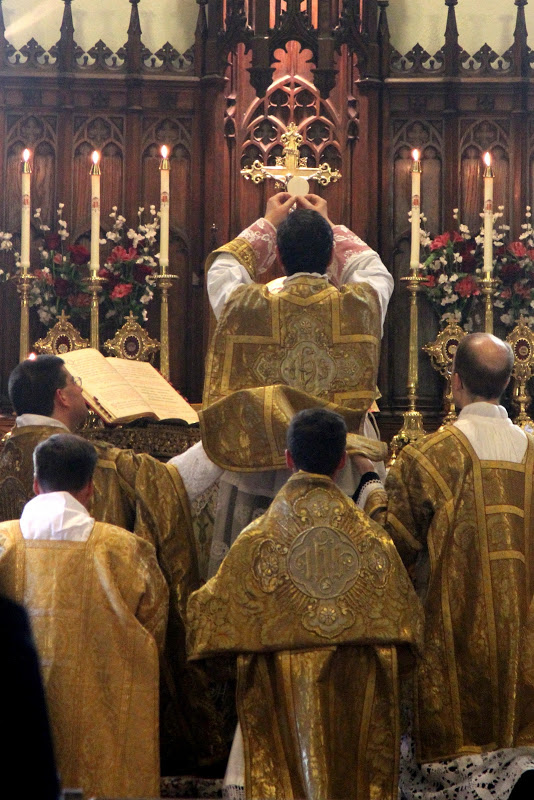One of the most common understandings of religion today is that it is all about right behavior. How many times have you heard, for example, the common cliche, “I don’t need to go to church to be a good Christian?”
The typical grumble about hypocritical Christians is another manifestation of this tendency. “Why don’t they practice what they preach?”
Another manifestation of this is the denigration of anything churchy. “Why would you pay so much money for those vestments and all those fancy statues when there are poor, homeless people?” This also reveals itself in the brutalist church architecture–whether it is the fan shaped, suburban auditoria or the former supermarkets turned into minimalist shelters for the local mega church.
I have grumbled here before about neo-Pelagianism, or the religion of good works. The promotion of behaving well rather than believing well is all part of the same problem. We have come to think that right belief not only doesn’t matter, but that it is harmful and divisive. All that really matters is that we feed the hungry, house the homeless and give peace a chance.
Now before people start jumping like kangaroos to false conclusions, do not imagine that I am denigrating right behavior. Let me say loud and clear that I think the corporal works of mercy are vital and yes I do believe that passage in the gospel where Jesus says, “Inasmuch as you did this to the least, you did it to me.” Yes we should all be involved in charitable good works.
However, just as faith without works is dead so works without faith is dead.
Right belief is important and the one contribution that Catholics should make to this is that right belief is evidenced in the right kind of worship. Orthodox belief should be matched with orthodox worship and misguided worship is evidence of a misguided theology.
What sort of worship does God require? In Spirit of the Liturgy Ratzinger points out that the word “orthodoxy” means “true splendor” or “true glory” as well as “true opinion”. To believe well is to worship well and to worship well is evidence that we believe well. Thus the classic phrase, “Lex orandi, lex credendi” or “Right praying is right believing” or “what we pray we believe and what we believe we pray.”
While good works are vital, so is good worship.
If this is the case, then what does much our modern “worship” indicated about our belief? If the music is sentimental and overly emotional and designed to give us a warm, fuzzy feeling, then can this be said to be true worship of God, or is it just an emotional goose for us?
If the words are centered on us, our fellowship, our work in the world then are these words of worship or are they simply the sort of thing we might want to sing at a pep rally?
If the liturgy, music, architecture, seating and preaching is focussed on the fellowship, the people and our work in the world is this really worship at all or is it a team building exercise?
There is a gigantic problem with this sort of sentimental, people centered “worship” and that it is errm…people centered. Worship was supposed to be God centered.
True worship is God-centered and raises us up through valid participation in all that is beautiful, good and true, but this requires attention, concentration, hard work and discipline. It is not something achieved quickly, easily or cheaply.
False worship, like so much in our modern world, delivers what is attractive to the masses, gives a cheap thrill, is easy, sweet and instantly satisfying. It is, if you like, junk worship.
There are two other problems that go along with this false kind of worship. First is a practical problem and that is that it eventually empties churches. People centered churches usually do well in the short term because they really do help people and make them feel better, but before long people exit because they realize they don’t actually need church to get some advice on self esteem or self improvement.
More important is the second problem. Wrong worship does not actually put people in authentic encounter with God. In fact it cuts them off from God and has them worship a false God–the god of themselves, their pastor, their fellowship, their good charitable work, their community etc.
This is a false god just as surely as any of the false gods of the Old Testament, and the worst thing about it is that, like all counterfeits, it mimics the real thing very effectively.
That’s why it is so very attractive and seductive.







Once again I think you have defined the problem quite well. Those of us who see this are in the difficult position of having to go long distances to a church where the pastor understands or to just stay put and pray, pray, pray.